17 Most Fascinating Birds of Amazon Rainforest

The Amazon rainforest is home to over 1,300 bird species. The birds of Amazon rainforest are diverse and colorful, ranging from parrots and toucans to raptors and owls. Many of these birds are threatened by hunting and habitat loss, which are the main causes of their decreasing population numbers.
Birdwatching in the Amazon rainforest has become a popular ecotourism attraction in recent years, with destinations such as Manu National Park, Colca Canyon, and the Islas Ballestas
17 Fascinating Birds of Amazon Rainforest
Scarlet Macaw
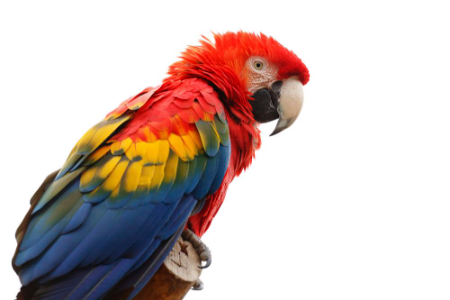
The Scarlet Macaw is a stunning bird known for its vibrant feathers in shades of red, blue, and yellow. Found in the tropical rainforests of the Amazon basin, it prefers areas with tall trees where it can build nests. This majestic bird feeds on fruits, nuts, seeds, and insects.
Hyacinth Macaw
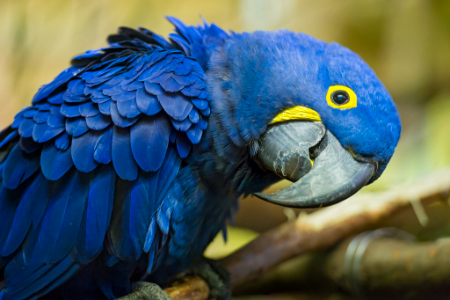
Hyacinth macaws are recognizable with deep cobalt-blue plumage and striking yellow eye-ring. These are some of the most captivating birds in the Amazon rainforest.
It inhabits palm groves and savannas near rivers, feasting on nuts like macadamia and acuri palms.
Toco Toucan
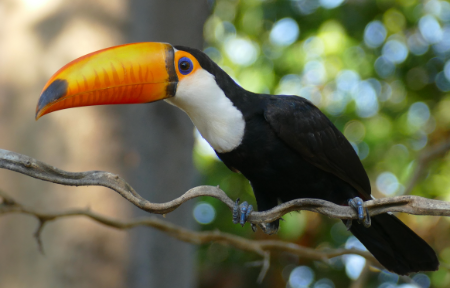
Toco Toucan is recognizable by its large colorful beak that measures up to 20 centimeters long (that’s about 8 inches!).
These birds add a touch of whimsy to the rainforest canopy. Toco is found in fruit-bearing trees as they consume fruits but also eat smaller prey such as lizards or eggs.
Blue and Yellow Macaw
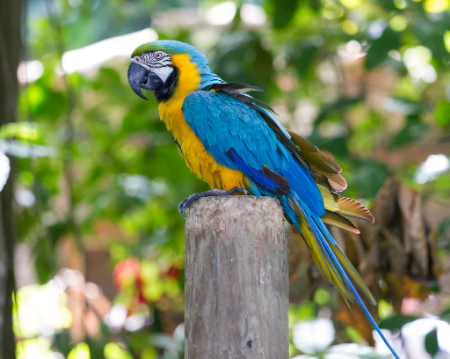
Blue and Yellow Macaw has electric blue wings paired with bright yellow underparts characterizing the iconic. These birds are an inhabitant of humid forests across South America including parts of the Amazon jungle. Its diet consists of various seeds along with fruits.
Harpy Eagle
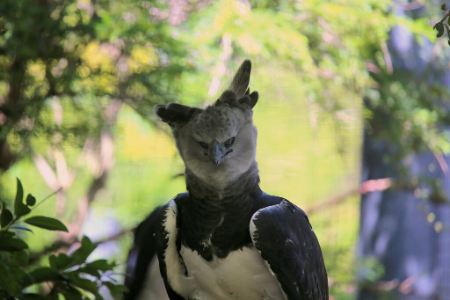
Harpy eagles are known for their sheer strength and impressive size. These birds reach over one meter in length. We can say that these are the most formidable predators of the Amazon rainforest.
They are found in dense forest foliage during daylight hours hunting mammals like monkeys or sloths.
Great Potoo
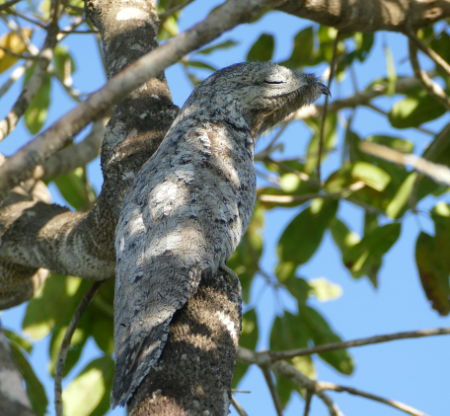
Great Potoo is a brown bird, resembling tree bark during the daytime. Their feather makes them a camouflage.
This nocturnal bird is found in forest clearings, and it hunts for insects such as moths or beetles by staying alert through the night.
King Vulture
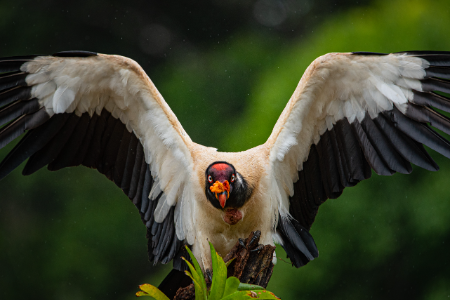
source: Photo by Erick Arce (pexels)
King Vulture has a white plumage contrasted with bright orange and yellow on its head and neck. These birds are usually found in wet tropical forests where they scavenge on carrion. King Vulture plays an important ecological role in cleaning up decaying organic matter.
Black-banded Woodpecker
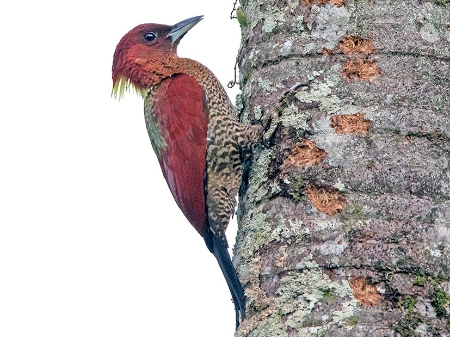
Black-banded Woodpeckers inhabit mature forests throughout South America including the Amazon rainforest. They have striking black-and-white patterned feathers making the Black-banded Woodpecker quite unique.
These expert climbers use their strong beaks to drill holes into tree trunks to extract wood-boring beetle larvae which serve as their main food source.
Spectacled Owl
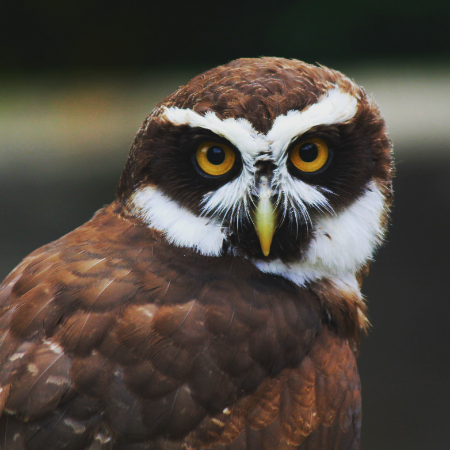
Photo by Michelle Reeves (pexels)
Spectacled Owls are named due to their distinctive facial disc resembling eyeglasses. These birds remain active during twilight hours within dense lowland rainforests.
Although they are versatile hunters adept at capturing various prey like rodents and birds, this owl often feeds on large insects like grasshoppers or katydids.
Montezuma Oropendola
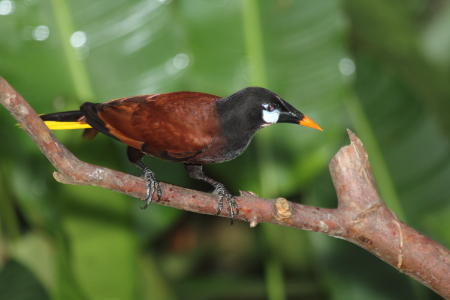
Source: Wikimedia
They have impressive colonies hanging from branches high above ground level which is one of nature’s architectural wonders. The Montezuma Oropendola are known for their woven pendulous nests that can house many individual birds.
While they feed on fruits and nectar from flowers especially those produced by Cecropia trees. They also feed on insects during the breeding season.
Golden-headed Manakin
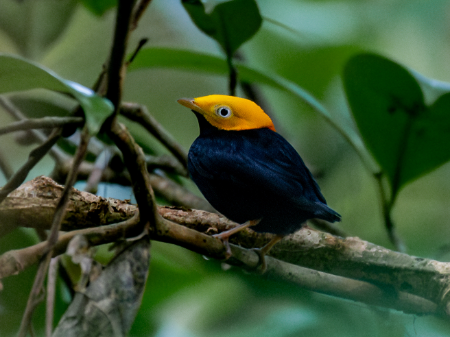
Source: WIkimedia
Golden-headed Manakin is small but attired with striking yellow plumage atop its head. They also have contrasting jet-black wings. These birds are found in lowland Amazon forests, it survive on a diet composed of fruit flies.
Capped Heron
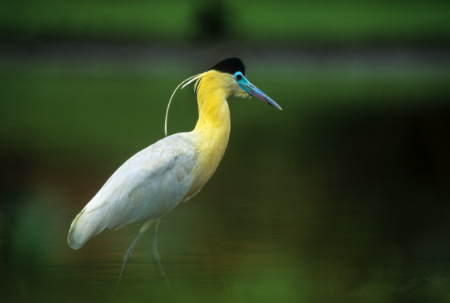
Source: Wikimedia
Capped Heron is recognizable due to its slate-gray plumage with a contrasting cap of white feathers.
They live among marshes and swamps. It prefers wetlands or riverbanks where it can capture fish and amphibians using its sharp beak.
Dusky-headed Parakeet
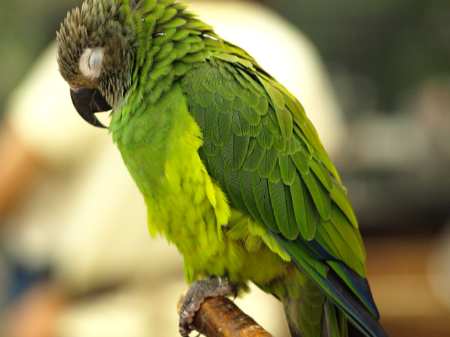
Source: Wikimedia
Dusky-headed Parakeet are gregarious nature of the medium-sized. They have green plumage and are apparent as they move around in large flocks through tropical rainforests.
They also have high-pitched calls resonating across the emerald-green landscape. Their omnivorous diet comprises fruits, seeds, flowers, buds, and even insects when available.
Amazon Kingfisher
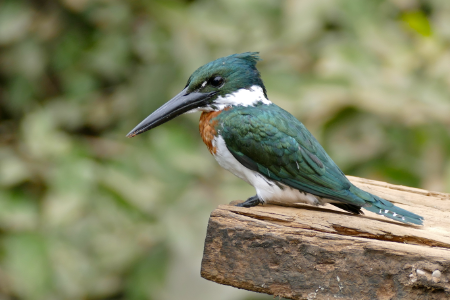
Source: Wikimedia
Amazon Kingfisher has enchanting vivid blue plumage accompanied by intricate patterns highlighting bright colors. They adapt to various freshwater habitats like rivers or lakeshores. These birds can also be found within dense jungles.
They feed on small fish – their primary food source – during impressive aerial dives into the water
Black-collared Hawk
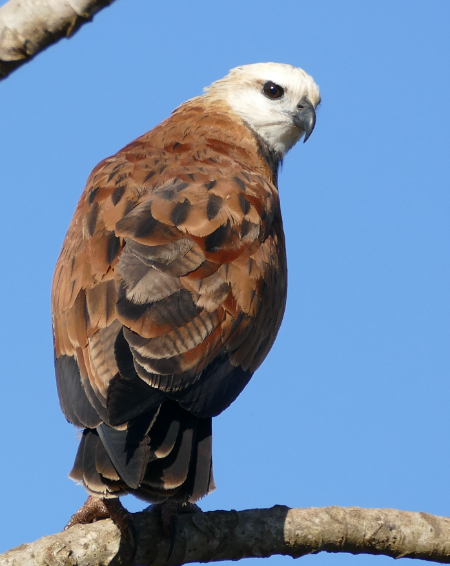
Source: Wikimedia
Black-collared hawk has fiery-red eyes contrasting against its dark feather coat paired with distinctive white shoulder patches.
Its carnivorous diet includes small mammals like rodents along with amphibians and reptiles caught near bodies of open water.
Yellow-rumped Cacique
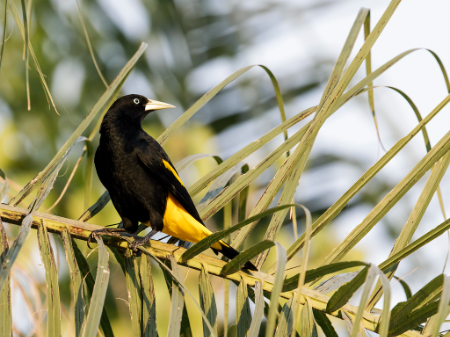
Creator: Nick Athanas ( Flickr)
Yellow-rumped Cacique inhabitants in lush forest edges or flooded areas next to rivers. These birds also have communal nests suspended from tree branches housing many individuals collectively known as colonie.
They have vibrant yellow coloring covering both their upper and lower parts. They rely mainly on fruits but supplement their diet with insects or spiders.
Giant Cowbird
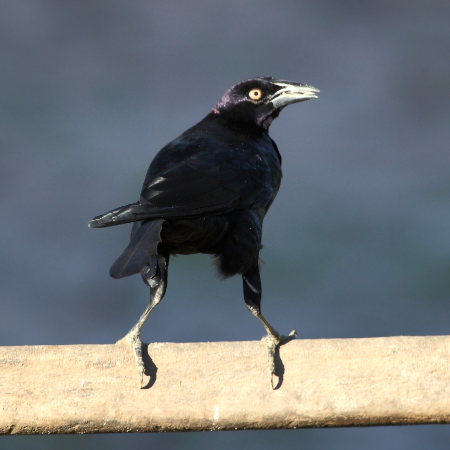
Source: Wikimedia
Giant cowbirds are larger than the average cowbird. These birds boast glossy black feathers which set it apart from other species within this family. They also consume seeds and insects when available.






